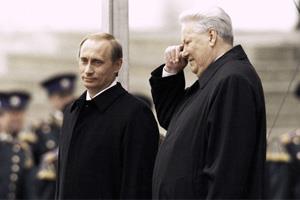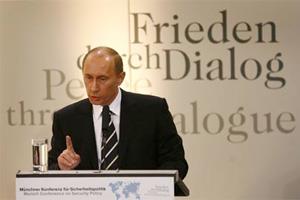Frontline’s A to Z Vladimir Putin primer, affixed with the sexier title of Putin’s Revenge, is dutifully sober and cautionary without being particularly revelatory. That is unless you’ve been paying no attention at all.
Airing in two parts on PBS -- Wednesday at 10 p.m. ET on Oct. 25 and Nov. 1 -- it’s also billed as “epic” and “stunning” in publicity materials. But although valuable and worthwhile in its efforts to pull everything together, this two-hour video document also seems well-worn in its telling of how and why the former KGB agent buggered the 2016 presidential election.
No living U.S. presidents with up-close impressions of the cold-eyed Russian president are interviewed for this documentary film. Nor is Putin himself or the woman who ran afoul of his machinations -- Hillary Clinton. There is, however, a continuous parade of 60-some journalists, historians, diplomats and former U.S. intelligence agency heads, with Will Lyman, as usual, presiding as narrator.

Putin, hand-picked by a dog-tired and eventually remorseful Boris Yeltsin (right) to succeed him, has been running the Russian show since New Year’s Day, 2000. He is depicted, not surprisingly, as a man who will do whatever it takes to bolster his power, crush dissent and waylay any perceived U.S. efforts to dislodge or compromise him.
“He is a professional liar,” says Russian journalist Yevgenia Albats.
“People in the streets is a really frightening sight to Putin,” adds Masha Gessen, author of The Man Without A Face: The Unlikely Rise of Vladimir Putin.
He initially perceived a soft touch in President George W. Bush, who infamously and very publicly praised Putin as trustworthy after their first meeting in Slovenia. “I was able to get a sense of his soul,” Bush said while Putin stood nearby. “I wouldn’t have invited him to my ranch if I didn’t trust him.”
It would be interesting to hear firsthand what Bush now thinks of those remarks. Perhaps Frontline made an effort to interview him and/or President Obama. But viewers aren’t told one way or the other.

One of the documentary’s most vivid quotes is from then-U.S. ambassador to NATO Victoria Nuland, a firsthand witness to Putin’s pointed diatribe against the U.S. at a 2007 security conference in Munich (right). “I was four rows back,” she recalls, “and you could almost feel the humidity of the spittle that was spewing.”
Nuland later felt the heat herself as John Kerry’s assistant secretary of state. During a 2014 phone call to U.S. ambassador to Ukraine Geoffrey Pyatt, she told him “F**k the EU (European Union)” in terms of the U.S. interceding on Ukraine’s behalf and against Putin’s strong-armed efforts to keep the country under Russian control. The leak of the phone call was blamed on Russian operatives.
In Putin’s Revenge, Nuland basically laughs off her “barnyard epithet” and says she was an easy target. She’s not pressed any further in what now looks to be a strong impetus for Putin to meddle in the 2016 election as further retribution for what he perceived as U.S. interference in Russian matters. Nuland also is shown passing out sandwiches to Ukraine dissidents.
It’s been well-documented that President Obama hesitated to publicly condemn Russia’s hacking campaign for fear of also being upbraided for trying to tilt the 2016 election in favor of Hillary Clinton. At the same time, Donald Trump publicly encouraged the Russians to continue leaking damning information against his opponent. Putin’s Revenge covers all of this ground again but also the less well-known private confrontation between Obama and Putin at the G20 Summit in China. After a group photo op, he pulled Putin aside and reportedly told him in so many words, “We know what you’re doing, and you need to stop it.”
Putin’s Revenge also is instructive in revisiting an explosive, back-to-back-to back chain of events. In the end, they served to make a footnote of Obama’s decision to finally let U.S. Intelligence director James Clapper and Homeland Security head Jeh Johnson issue a joint statement condemning Russian interference in the U.S. election, but without naming Putin.
Johnson says he thought it would dominate the weekend news cycle. But then came the Access Hollywood “grab them by the pussy” video, which at the time seemed to doom Trump’s candidacy. Except that within hours on the same day, Friday, Oct. 7, WikiLeaks dumped its first batch of hacked damning emails from Hillary Clinton’s campaign chairman, John Podesta. They served to put her candidacy back on the firing line, and Putin’s Revenge makes a case that this was hardly coincidental.
“By the way,” Clapper says at the end of Part 2, “the Russians aren’t going to stop.” Each hour ends with a close-up of Putin’s unyielding poker face.
Frontline capably ties all of this together in intelligent, intelligible fashion, but without any bombshells. Putin continues to deny all. And no matter how many more twists and turns the “Russian collusion” story might take, this no doubt will remain the one constant.